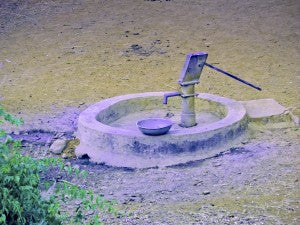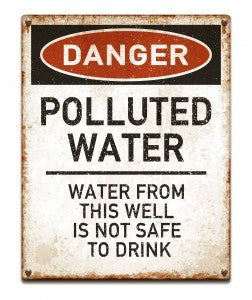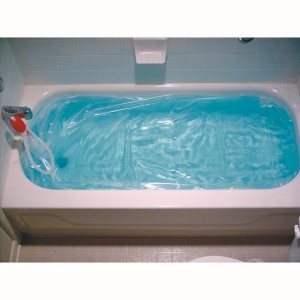What Happens When There’s No More Water?
[caption id="attachment_17718" align="alignright" width="300" class=" "]

Do you have more than one water resource?[/caption]
Bob Marley once said, “You ain’t gonna miss your water until your well runs dry.”
When Abelardo’s well ran dry nearly a year ago, he feared the worst. On fixed income and in the middle of the San Joaquin Valley in California, the four-year drought threatened to force the 81-year-old man to move away from his home. Hundreds of others are in the same situation, as the water shortage in California drags on. Fortunately for Abelardo, help came to him by the aid of a non-profit organization that dug him a new, much deeper well.
As ground water levels drop in California, farmers pump more and more water out of the ground to try and save their crops. This causes the water levels to drop even further, drying up wells. Reservoirs are low, and there is far less snow in the mountains this year than there were last year. All these factors threaten to make the drought in California much worse this summer.
The state of California pumps over 10 billion gallons of water per day. That’s an average of 258 gallons of water per day per person. That’s a lot of water! Now take into consideration that
less than 1% of all the water on our precious Earth can actually be used by people (everything else is salt water or frozen solid). As a comparison, take flushing the toilet. Each flush uses about 3.5 gallons of water. So if you flush the toilet five times in one day, you’re using 17.5 gallons of water. That means if everyone in California flushed their toilet 5 times a day, that would use over 650 million gallons of water. So you can see how quickly water can go, well, down the drain.
There are other ways for ground water to become unusable or inaccessible. What might happen if the power grid goes down? The municipal water facilities won’t be able to supply your home with water. What then?
[caption id="attachment_17719" align="alignleft" width="252"]

Drinking water won't always be readily available.[/caption]
Or how about chemicals and other contaminants that can penetrate our precious ground water? Ground water gives over half of the total U.S. population its drinking water, and it
helps grow 64% of our crops. Septic tanks or gasoline and oil storage tanks – all kept underground – may leak and spill their contents into the soil and water. This leads to contamination containing bacteria, viruses, chemicals, and other harmful substances. Even road salts can Replace their way underground. Landfills also give us other hazards, from leaking battery acid, paint, and other abandoned products.
Think about how much water you use in a day, from bathing, cooking, drinking, washing, flushing, and all other things we use water for. How desperate would you be without that essential liquid? Personally, I’d be hosed (too soon?).
As you can see, there are more reasons than just drought and overuse that can keep us without water. Fortunately, we have a way to prepare against such calamities.
By building up your water storage, you’re preparing yourself for all of these unforeseen disasters. There are a lot of different options for storing water. There are large,
160 gallon water reserves available, which can even
stack on top of each other, thus maximizing storage space. However, that may be a tad too large. If you’re like me and live in a small apartment, you might need something a little smaller. Boxed water kits and smaller 5 gallon jugs might be the only option you have, and that’s OK. Heck, if you have an extra bathtub, we even have a storage product that converts your tub into a
65 gallon water storage container!
[caption id="attachment_17720" align="aligncenter" width="300"]

From bathtub to water storage![/caption]
Essentially, water is important. Without it, life wouldn’t just be hard, it would cease. That’s why preparing for water shortages of any kind is vitally important.
Now we want to hear from you! What are some other ways you have for storing water? What unique situations are you in that makes storing water more difficult? Let us know in the comments!
 Do you have more than one water resource?[/caption]
Bob Marley once said, “You ain’t gonna miss your water until your well runs dry.”
When Abelardo’s well ran dry nearly a year ago, he feared the worst. On fixed income and in the middle of the San Joaquin Valley in California, the four-year drought threatened to force the 81-year-old man to move away from his home. Hundreds of others are in the same situation, as the water shortage in California drags on. Fortunately for Abelardo, help came to him by the aid of a non-profit organization that dug him a new, much deeper well.
As ground water levels drop in California, farmers pump more and more water out of the ground to try and save their crops. This causes the water levels to drop even further, drying up wells. Reservoirs are low, and there is far less snow in the mountains this year than there were last year. All these factors threaten to make the drought in California much worse this summer.
The state of California pumps over 10 billion gallons of water per day. That’s an average of 258 gallons of water per day per person. That’s a lot of water! Now take into consideration that less than 1% of all the water on our precious Earth can actually be used by people (everything else is salt water or frozen solid). As a comparison, take flushing the toilet. Each flush uses about 3.5 gallons of water. So if you flush the toilet five times in one day, you’re using 17.5 gallons of water. That means if everyone in California flushed their toilet 5 times a day, that would use over 650 million gallons of water. So you can see how quickly water can go, well, down the drain.
There are other ways for ground water to become unusable or inaccessible. What might happen if the power grid goes down? The municipal water facilities won’t be able to supply your home with water. What then?
[caption id="attachment_17719" align="alignleft" width="252"]
Do you have more than one water resource?[/caption]
Bob Marley once said, “You ain’t gonna miss your water until your well runs dry.”
When Abelardo’s well ran dry nearly a year ago, he feared the worst. On fixed income and in the middle of the San Joaquin Valley in California, the four-year drought threatened to force the 81-year-old man to move away from his home. Hundreds of others are in the same situation, as the water shortage in California drags on. Fortunately for Abelardo, help came to him by the aid of a non-profit organization that dug him a new, much deeper well.
As ground water levels drop in California, farmers pump more and more water out of the ground to try and save their crops. This causes the water levels to drop even further, drying up wells. Reservoirs are low, and there is far less snow in the mountains this year than there were last year. All these factors threaten to make the drought in California much worse this summer.
The state of California pumps over 10 billion gallons of water per day. That’s an average of 258 gallons of water per day per person. That’s a lot of water! Now take into consideration that less than 1% of all the water on our precious Earth can actually be used by people (everything else is salt water or frozen solid). As a comparison, take flushing the toilet. Each flush uses about 3.5 gallons of water. So if you flush the toilet five times in one day, you’re using 17.5 gallons of water. That means if everyone in California flushed their toilet 5 times a day, that would use over 650 million gallons of water. So you can see how quickly water can go, well, down the drain.
There are other ways for ground water to become unusable or inaccessible. What might happen if the power grid goes down? The municipal water facilities won’t be able to supply your home with water. What then?
[caption id="attachment_17719" align="alignleft" width="252"] Drinking water won't always be readily available.[/caption]
Or how about chemicals and other contaminants that can penetrate our precious ground water? Ground water gives over half of the total U.S. population its drinking water, and it helps grow 64% of our crops. Septic tanks or gasoline and oil storage tanks – all kept underground – may leak and spill their contents into the soil and water. This leads to contamination containing bacteria, viruses, chemicals, and other harmful substances. Even road salts can Replace their way underground. Landfills also give us other hazards, from leaking battery acid, paint, and other abandoned products.
Think about how much water you use in a day, from bathing, cooking, drinking, washing, flushing, and all other things we use water for. How desperate would you be without that essential liquid? Personally, I’d be hosed (too soon?).
As you can see, there are more reasons than just drought and overuse that can keep us without water. Fortunately, we have a way to prepare against such calamities.
By building up your water storage, you’re preparing yourself for all of these unforeseen disasters. There are a lot of different options for storing water. There are large, 160 gallon water reserves available, which can even stack on top of each other, thus maximizing storage space. However, that may be a tad too large. If you’re like me and live in a small apartment, you might need something a little smaller. Boxed water kits and smaller 5 gallon jugs might be the only option you have, and that’s OK. Heck, if you have an extra bathtub, we even have a storage product that converts your tub into a 65 gallon water storage container!
[caption id="attachment_17720" align="aligncenter" width="300"]
Drinking water won't always be readily available.[/caption]
Or how about chemicals and other contaminants that can penetrate our precious ground water? Ground water gives over half of the total U.S. population its drinking water, and it helps grow 64% of our crops. Septic tanks or gasoline and oil storage tanks – all kept underground – may leak and spill their contents into the soil and water. This leads to contamination containing bacteria, viruses, chemicals, and other harmful substances. Even road salts can Replace their way underground. Landfills also give us other hazards, from leaking battery acid, paint, and other abandoned products.
Think about how much water you use in a day, from bathing, cooking, drinking, washing, flushing, and all other things we use water for. How desperate would you be without that essential liquid? Personally, I’d be hosed (too soon?).
As you can see, there are more reasons than just drought and overuse that can keep us without water. Fortunately, we have a way to prepare against such calamities.
By building up your water storage, you’re preparing yourself for all of these unforeseen disasters. There are a lot of different options for storing water. There are large, 160 gallon water reserves available, which can even stack on top of each other, thus maximizing storage space. However, that may be a tad too large. If you’re like me and live in a small apartment, you might need something a little smaller. Boxed water kits and smaller 5 gallon jugs might be the only option you have, and that’s OK. Heck, if you have an extra bathtub, we even have a storage product that converts your tub into a 65 gallon water storage container!
[caption id="attachment_17720" align="aligncenter" width="300"] From bathtub to water storage![/caption]
Essentially, water is important. Without it, life wouldn’t just be hard, it would cease. That’s why preparing for water shortages of any kind is vitally important.
Now we want to hear from you! What are some other ways you have for storing water? What unique situations are you in that makes storing water more difficult? Let us know in the comments!
From bathtub to water storage![/caption]
Essentially, water is important. Without it, life wouldn’t just be hard, it would cease. That’s why preparing for water shortages of any kind is vitally important.
Now we want to hear from you! What are some other ways you have for storing water? What unique situations are you in that makes storing water more difficult? Let us know in the comments!


3 comments
Taylor Hansen
I’m glad you talked about building up water storage in case of an unforeseen disaster. My uncle was telling me that he wants to install a new well on his property in case a disaster happens. He should have it installed on the right part of his property so it works and won’t leak. http://www.sheppardswelldrilling.com/services.html
Jim
How can I find natural springs in my aera?
Emergency Essentials
http://www.findaspring.com/ should be able to help you find a natural spring near you!